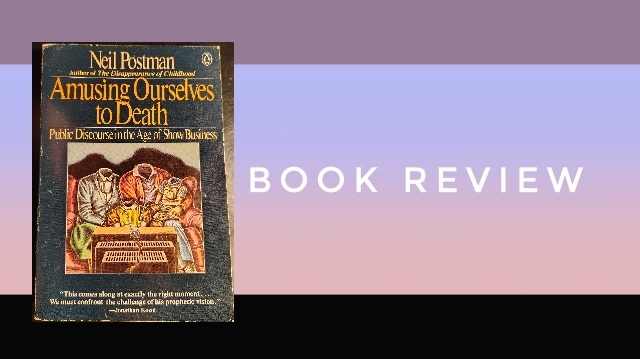By Neil Postman
| One day, as I was contemplating the shear volume of media content that humanity has created—and the inability of one single person to consume a meaningful portion of it–I came across a book titled “Amusing Ourselves to Death.” Intrigued, I immediately bought the book and placed it in my bookshelf where it sat until I challenged myself by giving up video content for a number of months. At the time, I was on an anti-fiction, pro nonfiction kick believing that one genre definitely benefitted humanity more than the other. As a result, I guess I projected some of my own thoughts onto the author. I expected him to dive into such concepts as the amount of time and money—valuable resourses—that humanity spends on entertainment, the dilution of quality content in relation to the quantity of options, the displacement of man-hours that could be better spent on social activities, religion, philosophy, and emotional pursuits.
Ultimately I missed the mark as the author’s thesis was this, video has changed society. The fact that this book was published before the internet was a part of public life and television was “king” added to the appeal. I liked compareing the author’s era to our own. To give y’all a taste of what this book has to offer, here is my summary of chapter 6 followed by a bullet-list of the book’s biggest take aways:
Chapter 6 Summary
…”There is No Business But Show Business.” This paraphrased quote is how the author concludes the sixth chapter of his book. Throughout the chapter the author points out the bias of television and how it affects it’s content. The emotional ques, the fast pace of each scene being presented. He argues that everything presented in a video format is geared towards entertainment. As such, moments to pause and to “think things over things” don’t play well on the television screen. He goes on to say that debates, particularly those of a political nature, are won with witty one liners and making the opposition look bad as opposed to winning the audience over with substance. The partakers would rather be meet with applause instead of reflection.
Bullet-List
1) The predominance of the written word, had a major impact on America’s past culture, and it’s modern replacement, video content–and specifically, television–has had a major impact on America’s modern culture.
2) The “mediums” available to a people in thier particular era, books, CDs, or the internet for example, affect the culture of that era.
3) The processing of words demands understanding. Videographical mediums demand the audience be entertained.
4) The written word promotes adherence to logic.
5) Audiences of videographic material want the content to be packaged in a short, concise, and uncomplicated way. This is especially true for advertisements, including political advertisements, and thus commercials have become more of a reflection of the audiences’ desires as apposed to a representation of the product or service.
6) The instant gratification and continuously, endless stream of entertainment provided by the television has largely made people uninterested in the past.
7) To televise something is to translate in into a different form.
Conclusion
In place of my own, I will leave my readers with the author’s conclusinary statement.
“It comes as the unintended consequence of a dramatic change in our mode of public conversation. But it (television) is an ideology nonetheless, for it imposes a way of life, a set of relations among people and ideas, about which there has been no consensus, no discussion, and no opposition. Only compliance. Public consciousness has not yet assimilated the point that technology is ideology.”
— TBryantS
